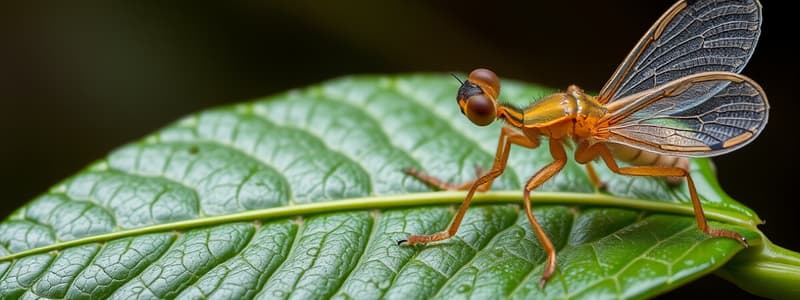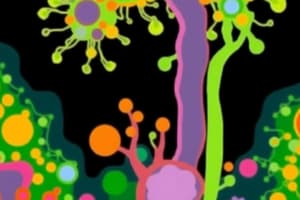Podcast
Questions and Answers
What defines an organism?
What defines an organism?
An organism is a life form, a living entity that contains one or more cells.
What are the five characteristics that living organisms share?
What are the five characteristics that living organisms share?
Cells, Replication, Information, Energy processing, Evolution
What are cells?
What are cells?
The simplest self-replicating entity that can exist as an independent unit of life.
What is replication?
What is replication?
What is information in the context of living organisms?
What is information in the context of living organisms?
What does evolution mean?
What does evolution mean?
Which of the following is NOT related to the five fundamental characteristics of life?
Which of the following is NOT related to the five fundamental characteristics of life?
What does the cell theory state?
What does the cell theory state?
What was the purpose of Pasteur's swan-flask experiment?
What was the purpose of Pasteur's swan-flask experiment?
Flashcards are hidden until you start studying
Study Notes
Organisms and Their Characteristics
- An organism is defined as a living entity that contains one or more cells.
- Five key characteristics define living organisms:
- Composed of cells, which are membrane-bound units.
- Capable of replication; they can make copies of themselves.
- Store, process, and exchange information, primarily via DNA and genes.
- Acquire resources and utilize energy for survival (e.g., plants converting sunlight).
- Evolve over time, leading to related species changing through generations.
Cell Definition and Importance
- Cells are the simplest self-replicating units of life and can exist independently.
- All living organisms are fundamentally made of cells.
Replication and Information
- Replication refers to the ability of an organism to copy itself.
- Information processing in living organisms involves storage, processing, and exchanging biological data.
Evolution
- Evolution is described as "descent with modification," indicating that species are interconnected and can change over time.
Characteristics of Living Organisms
- Living organisms are characterized by:
- Cellular structure
- Replication abilities
- Information handling
- Energy processing
- Evolutionary capacity
Living vs. Non-living Examples
- Wine cork and dried beans (seeds) are considered living due to their cellular structure and other characteristics.
- Viruses are classified as non-living because they require a host to replicate.
Fundamental Characteristics Misconception
- The statement regarding giraffes having longer necks is not directly related to the five fundamental characteristics of life.
Origins of Organisms
- All organisms are derived from cells, supported by two major theories:
- Cell Theory: All living organisms are made of cells, and all cells arise from pre-existing cells.
- Theory of Evolution: Explains the connection and changes among species over time.
Theories vs. Hypotheses
- A theory is a well-supported body of ideas based on extensive empirical evidence, while a hypothesis is a testable statement that explains a phenomenon.
The Cell Theory
- Formulated primarily by Robert Hooke, stating that:
- All living organisms consist of cells.
- All cells come from existing cells, disproving spontaneous generation.
Pasteur's Swan-Flask Experiment
- Louis Pasteur's experiment tested the hypothesis that cells originate only from other cells.
- The experiment involved sterilizing nutrient broth and using swan-neck flasks to prevent contamination.
- Results showed no cell growth in the sterilized medium, reinforcing the notion that cells do not arise spontaneously and supporting the Cell Theory.
Studying That Suits You
Use AI to generate personalized quizzes and flashcards to suit your learning preferences.




